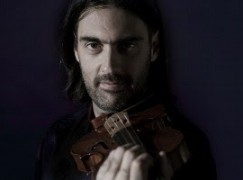Why no-one wants to know England’s most-loved composer
Album Of The WeekFrom the Lebrecht Album of the Week:
… The third and fifth symphonies are powerful commentaries on war and peace by a man who saw the carnage and kept his principles intact. He was a pacifist who fought evil, an atheist who composed church liturgy and a humanitarian who put compassion above all other concerns. It is fair to say that, in Britain, he attracts more affection than any native composer except Elgar….
Read on here.
And here.
In Spanish here.
In Czech here.
In French ici.
In The Critic here.






As to RVW not travelling…Hmm.
Andrew Manze did a RVW cycle in Glasgow and, working in a charity bookshop, I noticed him among the customers and spoke briefly to him about his RVW cycle. He said he had been programming RVW with orchestras he conducts on the continent and the responses tended to be very favourable, to the effect that he was such an impressive composer they were surprised not to have encountered him before.
Williams’ Antarctic Symphony, one I have had and played often for decades, should and I would say does not contain any echoes of “Arctic tundra.” We are talking opposite ends of the earth.
But I agree that VW’s music is underplayed and perhaps, as you suggest, underappreciated. I have a great deal of it and have heard more and, while I admit that I have a taste for English music, it always surprises me when I see one more season of the orchestras to which I have most access failing yet again to programme any of his great repertoire. May your review be a trigger to the consciences of many a music director.
There are two recordings of the Tallis Fantasia on Digital Concert Hall with Rattle and the BPO. Could you imagine Petrenko conducting the First Symphony?
He did do Elgar 2 with them several years ago…
Here is ~ 3 minutes of the performance. Based on this small sampling I’d like to hear more but I doubt it would ever replace my Boult or Davis. That said it isn’t in any way the cultural illiteracy that HvK wrought on Holst with the same orchestra.
https://www.youtube.com/watch?v=Aftq_Yrudv8
He’s a highly intelligent and open-minded artist, so it’s quite possible.
The Symfonieorkest Vlaanderen performed RVW’s 5th symphony in May 2021 (giving the work , (erroneously) a title – The celestial city)….
Even so, RVW, travels quite well in the Low Countries and France!
It is hard to know why RVW is not more appreciated outside the UK, although there is so much music available that it is very difficult for most audiences to cover more than a small proportion of the available repertoire . The music by and large is intensely atmospheric, often sad , and nearly always immediately appealing . However, it is often on a larger scale ( Brucknerian ? ) than many are comfortable with , and sometimes for unfashionable concertante combinations e.g tuba , viola , two piano concertos etc. But then , how much do we hear of composers of a similar era e.g. Roy Harris, Aaron Copland ( apart from a few warhorses) , Franz Schmidt , William Walton , Poulenc, and even Sibelius ?
I would say interestingly different concertante combinations! An endless diet of violin/cello/piano concertos is rather unimaginative. The tuba concerto is an excellent work!
BBC (R3) recently commented that thei surveys show that RVW is now Britain’s most popular composer. There are now more performances than ever outside UK which are being taken there by an ever-wider range of conductors.
As I recall in the 70’s Colin Davis brought the 4th to the BSO and the results were so well received that the performance was included in the CD box set celebrating the orchestra’s centenary.
RVW is simply one of the greatest symphonists of the 20th century, standing tall beside any and all others; and I can find no hint of “banging on” in these remarkable works. And then there’s The Lark Arising, Serenade to Music, Tallis Fantasia, etc., etc., etc. Life affirming stuff!
The Lark Ascending, of course! Just goes to show I can’t eat breakfast and think at the same time……
I believe there is a moderate amount of prejudice against British music. That is the only reason I can think of that explains why so much of it that is top quality is relatively rarely played. It’s not just orchestral music, but chamber music and song. Not so long ago I read one critic praise Poulenc Sinfonietta (a nice work) and dismiss completely Walton’s Belshazzar’s Feast. American critics in particular seem excessively critical. But it also pervades Europe, where national pride and politics lead to the denigration of the music of France and Germany’s old enemy.
I also love French music.
That RVW isn’t so well known is no surprise. He’s in good company; so many fine composers of beautiful and tonal music were shunted aside by the serialists and composers of ugly music. Alwyn, Bax, Arnell, Rubbra, Schmidt, Roentgen…I’d even add Simpson. No doubt RVW was the best of the lot, but music directors and orchestras are lazy. Why try something new when you can hack out another Beethoven, Brahms or Tchaikovsky symphony with no effort. And that’s one thing about RVW: his music is hard to play. Some of the string writing is just vicious. Band musicians are well aware of the English Folk Song Suite, and even amateur orchestras tackle the overture to The Wasps from time to time. But the symphonies remain the territory of the true afficionados.
Not as hard as all that, surely? There isn’t a youth orchestra in the UK that hasn’t played his 2nd Symphony and the 1st and 5th Symphonies are both standard fare with amateur orchestras.
I love Vaughan Williams, though I don’t know all the symphonies. I sang in a choir for “A Sea Symphony” once and absolutely loved it. And heard Elgar Howarth conduct #4 in Seattle about 25 years ago – one of the best things I ever heard there. Would definitely like to hear U.S. orchestras play more of the symphonies.
A Sea Symphony — what a monumental work — might be costly for a lot of orchestras. More’s the pity, and thanks for flagging it — I have popped it on and it suits my mood late on a summer’s afternoon.
But many other works are as programmable as anything else they play. Is buying orchestral scores SO expensive nowadays that people just don’t go outside their libraries?
I used to wonder why , when a piece I had not seen available for donkey’s years turned up on the schedule, it simultaneously appeared in the programmes for that season of two or more other orchestras. I assume now it is some sort of cost-sharing over scores, the way opera houses share productions.
I wish a few WOULD pool on A Sea Symphony.
The problem with the Sea Symphony is that it’s choral, and (at least in the USA) orchestra people have a problem with choral works outside of the usual half-dozen or so standards. Like many of Vaughan Williams’s earlier works with large orchestra, the wind parts are generously cued to that smaller orchestras with only double wind can perform them. I sang in the Sea Symphony in just such a performance.
SJB and the Halle were an important part of my musical education. But ‘Glory days” (in your review)? I’d say. the current lineup is in a different league altogether.
I can’t resist making a case for RVW’s greatest “mostly unknown” work–“An Oxford Elegy.”
My favorite self-devised quip about it is, that it is “Brideshead Revisited” set to music.
The David Willcocks recording is iconic, but the recent one with Jeremy Irons as Speaker is also very very good.
Pity it is hardly programmed in the US, ever. I have heard it live exactly once.
I’m proud to say we performed the “Elegy” here in Seattle in the mid-1990s. The audience response was positive in the extreme.
I agree, it’s heart-breakingly beautiful. Wonderful words as well. And from a Cambridge man!
My old Oxford tutor Bernard Rose, who gave the first performance in (I think) 1954, chose this work for his farewell concert from Magdalen College, Oxford way back in 1981. Not a dry eye in the Chapel.
RVW is in good supply on classical radio stations in the US. He wrote some self-contained shorter works (green sleeves, Thomas Tallis, Lark Ascending, etc.) which meet the time schedules of the modern listeners. Full length symphonies are played less often than single movements from symphonies. The shorter works are also played as the first work on a symphony program.
RVW symphonies are played more often than Bax or anything by Delius.
My view is limited by age (I’m old), location (the US) and income (I live on a fixed income). If I had more money I would be able to attend concerts and buy CDs, and my choice would be without limit, in a manner of speaking. But I live in modern times and I have limited time even to listen to internet concerts.
I grew up considering RVW as one of the giants of my time. In my eyes his position has remained constant.
I couldn’t live without Vaughan Williams. He is far and away my favorite 20th century composer, and I’ve had the pleasure of programming his music steadily for years. Perhaps my proudest moments (thus far) were presenting the Los Angeles premiere of “Job” in 1977 and the Northwest premiere of his Ninth in 2007. We’ll be marking his 150th anniversary with several performances this coming season.
You probably know that one of ‘Job’s greatest admirers was one Frank Sinatra.
Dear Mr. Keeley,
Thanks for your response. I didn’t specifically know about Sinatra’s affection for “Job”, but…
Back in 2009, I had heard for the first time that Sinatra had a strong affection for Vaughan Williams’ music. As an ardent admirer of both of those great musicians, my curiosity led me to write to Mr. Chuck Granata, a multifaceted author, producer, music historian, and Sinatra expert. My question — whether Mr. Granata knew exactly which Vaughan Williams works were Sinatra’s favorites — netted me a delightful and extensive response, which I still treasure. Here are excerpts from Mr. Granata’ s e-mail of 17 November 2009:
>> Frank Sinatra had a long, albeit “clandestine” relationship with classical music! By his own admission, he would listen for many hours when he was alone, and as you noted, he often cited Vaughan Williams as a particular favorite. Unfortunately, I can’t recall ever reading about a specific piece that he favored, though I would venture to say that it was likely VW’s standard repertoire that he was exposed to. I make this assumption since as a music industry insider, Frank probably received new releases from various record labels through the years, and all one needs to do is scan the most recorded pieces from the 40s, 50s, and 60s to get a good idea of what he might have been listening to.
>> Billy May told me that he, Frank, and their wives would often attend symphonic concerts in Los Angeles, and that Frank would sometimes shock him by citing a rarely heard work by Glière, or some other comparatively obscure composer. Billy was really struck by Frank’s knowledge and understanding of classical music, and their forays to the symphony reinforced for him that all the talk about FS being a classical music lover wasn’t at all apocryphal!
I would be far more concerned if his music fell out of favour with British audiences. I fear that his quintessential English voice will increasingly fall silent in a future destined to be more culturally fluid.
Thank God for the RVW Society.
In a better classical-music world, Vaughan Williams’s music would be as much a part of musical life as Shostakovich’s. (And every fourth or fifth orchestral concert you come across would have a Haydn symphony.)
Because I loved “The Lark Ascending” when I was young, and wanted (and got) the Hugh Bean/Boult recording I had heard broadcast, I became well acquainted with its LP disc-mate, the Symphony No. 6 early. The first RVW symphony I got to know.
Then my university orchestra played No. 2, which we all enjoyed and I still enjoy, and years later an amateur/semi-pro orchestra tackled No. 5. I remember our conductor, John Parfrey, felt he needed to make some remarks about the Fifth to our cautious “church lady” type audience and perhaps my memory is playing tricks but I recall him saying something like “perhaps none of us will ever hear this symphony in concert again” and, alas, he was in my case quite correct. I enjoy it on recordings but that is not the same as a concert — it is an excellent work for a “shared experience” situation.
I worked hard with my violin teacher on the scherzo movement to No. 5. It was actually great teaching material, so he did not mind this, but he himself had never played or even heard the work before, and he was a very experienced orchestral violinist who had studied under four great concertmasters (Gingold, Piastro, Guilet, Chaussow). He admitted “even for us (the Milwaukee Symphony violin section) this would be hard stuff.”
I think No. 6 is still my favorite RVW symphony, but, in a sense, I understand its neglect in this country. A symphony of that size is “end of concert” not “before intermission.” Conductors want ovations and how do you get your ovation after that desolate conclusion? Sometimes applause seems like an intrusion, and that would be one of those times.
He’s a great composer, but the endless promotion of the ‘cow looking over a gate’ works (Greensleeves, Lark Ascending, Folk Song Suite), to the exclusion of much else, has done incalculable harm to RVW’s standing.
Here in our small corner of New York City, our New York Repertory Orchestra has performed a lot of RVW’s music over the past 20+ years: Tallis Fantasia, Dives and Lazarus Variants, Serenade to Music (choral version), English Folk Song Suite, Norfolk Rhapsody 1, Lark Ascending, Overture and incidental music for The Wasps, and Symphonies 2, 3, 5, & 6 – and to celebrate his 50th birthday, we’ll be performing his 9th symphony on October 15th. His music does, in fact, travel quite well – even across the Atlantic. 🙂
Well, Radio 3 spent 3 weekd on his anniversary.
I’ve heard the 5th Symphony played by a few different orchestras over the years. I specifically remember Hartford because after the slow movement someone blew his nose loudly in the balcony. Montreal played the 2nd a decade ago. Their premier performance of the 4th was in 2013! Boston did the 6th Symphony in 2014. One of my most memorable concerts of all time was about 10 years ago when the terrific little Orchestra of Indian Hill played the awesome 8th Symphony.
Andrew Davis led the Fifth Symphony in Philadelphia about 20 years ago, and was delighted by the positive audience response.
I live in the US but got to know VW in the 1940s when I bought the 78RPM recording of him conducting his 4th Symphony. I immediately sought out more of his music, including Sir Adrian Boult’s recordings of Job, Flos Campi and the 6th Symphony. I think I have more recordings of VW’s music than any other composer. My favorites are the 3rd Symphony and Job.